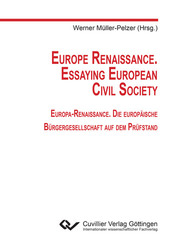| Areas | |
|---|---|
| Serie de libros (97) |
1381
|
| Nachhaltigkeit |
3
|
| Gesundheitswesen |
1
|
| Letra |
2370
|
| Medienwissenschaften | 16 |
| Teología | 57 |
| Filosofía | 102 |
| Derecho | 423 |
| Economía | 852 |
| Ciencias sociales | 417 |
| Ciencias del deporte | 48 |
| Psicología | 233 |
| Educación | 190 |
| Historia | 183 |
| Arte | 111 |
| Ciencias culturales | 166 |
| Literatur | 117 |
| Lingüística | 88 |
| Ciencias Naturales |
5407
|
| Ciencias Ingeniería |
1798
|
| General |
98
|
|
Leitlinien Unfallchirurgie
5. Auflage bestellen |
|
Erweiterte Suche
Europe Renaissance. Essaying European Civil Society (Tienda española)
Europa-Renaissance. Die europäische Bürgergesellschaft auf dem Prüfstand
Werner Müller-Pelzer (Editor)Previo
Indice, PDF (130 KB)
Lectura de prueba, Datei (320 KB)
In 2015, the European Union is not going well. But does this mean that Europe is not going well? More and more citizens of the European States make it very clear that they have another opinion about political participation as just to confer to the leaders of political parties a procedural legitimacy. Considering the epochal challenges (e.g. the migration from Africa) and the simultaneously increasing credibility deficit, the political establishment becomes ever more alienated from the citizens when staging „Europe Events“, without taking the European Civil Societies seriously as political partners. The present contributions have the intention to examine the situation of national Civil Societies in Europe and if one can speak of a comprehensive European Civil Society.
Im Jahr 2015 geht es der Europäischen Union schlecht. Aber geht es deshalb Europa schlecht? Die Bürger der europäischen Staaten machen zunehmend deutlich, dass sie ihre politische Mitwirkung anders verstehen, als dem Führungspersonal der Parteien eine prozedurale Legitimität zu verleihen. Angesichts epochaler Herausforderungen (z.B. die Migration aus Afrika) bei einem gleichzeitig wachsenden Glaubwürdigkeitsdefizit entfremdet es die politische Ebene noch mehr von den Bürgern, wenn „Europa-Events“ inszeniert werden, ohne die Bürgergesellschaften politisch ernst zu nehmen. Die vorliegenden Beiträge haben das Ziel zu prüfen, wie es um die nationalen Bürgergesellschaften Europas bestellt ist und ob von einer übergreifenden europäischen Bürgergesellschaft gesprochen werden kann.
| ISBN-13 (Impresion) | 9783736990326 |
| ISBN-13 (E-Book) | 9783736980327 |
| Formato | A5 |
| Idioma | Inglés, Francés, Alemán |
| Numero de paginas | 276 |
| Edicion | 1. Aufl. |
| Lugar de publicacion | Göttingen |
| Fecha de publicacion | 30.06.2015 |
| Clasificacion simple | Libro de divulgacion |
| Area |
Filosofía
Derecho Derecho y filosofía del estado, sociología de derecho Derecho internacional Economía Economía y ciencias políticas Economía política Historia de la economía e economía social Ciencias sociales Sociología Ciencias politícas Humanidades y el medio ambiente Ciencias culturales Literatur Estudio de las lenguas romanas Geografía comercial, social y cultural |
| Palabras claves | Feeling of belonging together, Civil Nation, Constitutional identity, European Right, Europeanization, Education, Good Governance, Auto-stereotypes, European competence, Negativity, Science, Post-growth economy, Zusammengehörigkeitsgefühl, Bürgernation, konstitutionelle Identität, europäisches Recht, Europäisierung, Bildung, Good Governance, Autostereotype, Europakompetenz, Negativität, Wissenschaft, Postwachstumsökonomie |








